Welcome to my guide on fantasy tropes and fantasy cliches. In fact, this is more than a guide. It’s an original piece of research (albeit small), that’ll give you crucial insights into how to avoid cliches in fantasy writing.
The point ought to be made at the outset that this post is by no means intended to discourage writers from writing their stories in a particular way. Rather, the purpose of this research is to give writers an insight into readers’ minds with the hope of helping them with their craft.
Tried and tested tropes are popular for a reason—they work. People like them. They make for enjoyable, engaging reads. And many of these tropes are synonymous with the fantasy genre, a genre that at the moment seems to be taking a step back and looking at itself in the mirror.
Choose A Chapter
- How To Avoid Cliches In Fantasy Writing
- What Are The Most Overused Fantasy Tropes and Cliches?
- The Results Of The Fantasy Cliches Poll
- Fantasy Cliche #1 – The Orphan Child Protagonist
- Fantasy Cliche #2 – Evil Because… Evil
- Cliche #3 The Damsel In Distress
- Fantasy Cliche #4 – The Foretold and Vague
- Cliche #5 – Typical Fantasy Races
- Other Fantasy Cliches And Tropes To Watch Out For
- Fantasy Cliches And How To Change Them
- Check Out More Guides On How To Avoid Cliches In Fantasy Writing
How To Avoid Cliches In Fantasy Writing
One of the best pieces of advice when it comes to knowing how to avoid cliches in fantasy writing is to simply be aware of what they are.
Chances are, you’ll be very familiar with many of the cliches and tropes that feature in the poll results below, for example, The Chosen One or the beardy mentor figure. In understanding what they are, you can identify them in your writing and then take steps to achieve more originality.
Another great tip for avoiding cliches in your writing is to work with beta readers and editors. You may be aware of the risk of straying into the realms of the cliche with your story and you can therefore ask people to see if you’ve done just that.
Editors can offer constructive advice on how to change things. Beta readers may give honest feedback on where things have become a bit cliche. You can then take action to change things up when you carry out your editing tasks.
What Are The Most Overused Fantasy Tropes and Cliches?
Fantasy is by far one of the most popular genres for writers. One book reviewer said to me the other day: “I receive a daily list from Readers Favorite and there is always a huge number of fantasy titles.” The fantasy market at the moment is heavily saturated with lots of stories featuring common character tropes. When situations like this arise, it has the potential to spark innovation, a shift. What can we do differently? In looking at the overused and common we can then find the unplugged gaps, the gemstones of originality, just like many brilliant writers have done with the ever-growing list of fantasy sub-genres.
It’s a competitive wilderness out there, and with the great developmental strides in self-publishing, things are only gonna get harder for writers. But that pressure can be a brilliant tool, one that can inspire and encourage you to push yourself to find and create something untapped. The insights below may help you get there.
The Results Of The Fantasy Cliches Poll
This research was inspired by a brilliant thread on r/fantasywriters, which you can read here. The most upvoted suggestions in that thread featured as suggestions in the poll. Voters could also suggest their own reasons, which I’ve included below (they didn’t show up in the main poll). Individuals could vote for more than one suggestion. In total, 491 votes were cast, a pretty sizable sample in my eyes and one that lends some credibility to the results.
The poll was made using CrowdSignal, a free and handy resource I came across when preparing this task. One of the things that appealed to me was its easy integration tools, particularly if your site is powered by WordPress. Embedding the poll was a simple matter of copying and pasting some code.
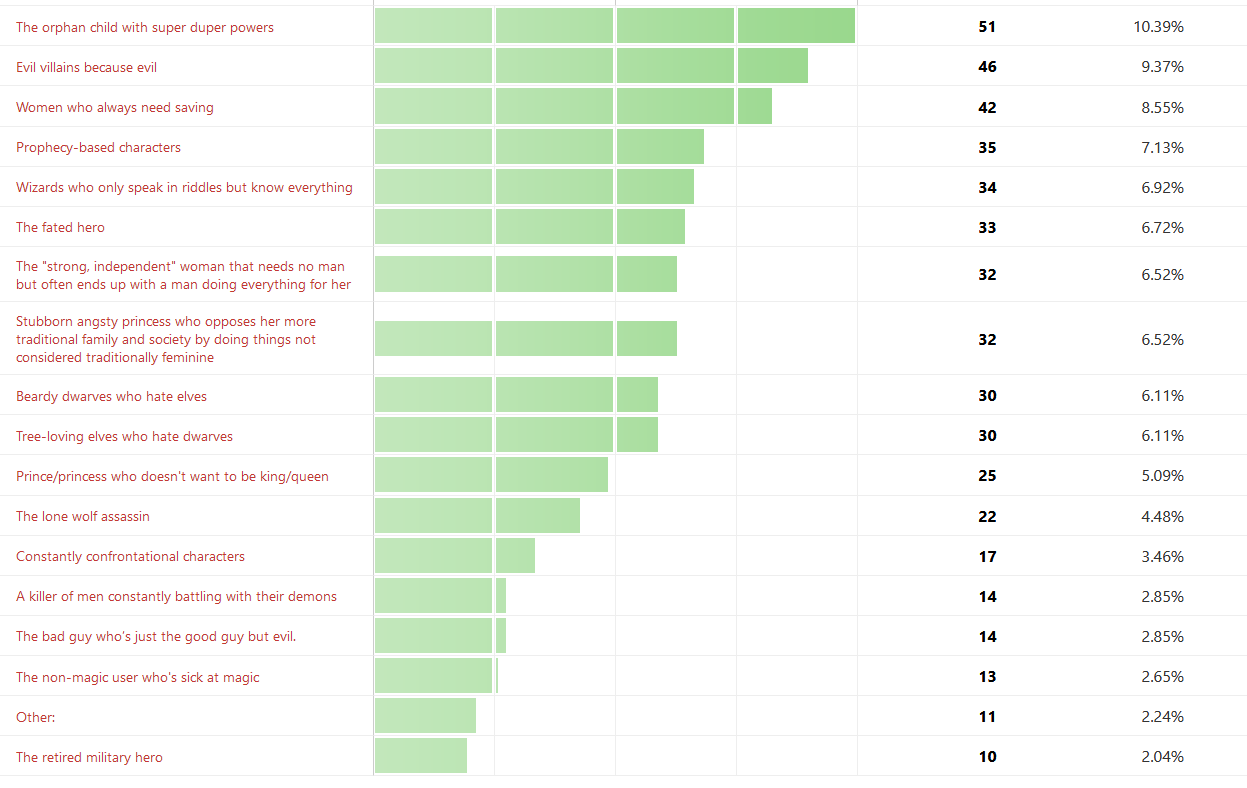
Fantasy Cliche #1 – The Orphan Child Protagonist
Sitting top of the list with a hefty 51 votes is ‘The orphan child with super-duper powers’. I’m sure we can all picture a character matching this trope—Harry Potter, Pug from Feist’s Riftwar Saga, or Vin in Mistborn.
While common, I don’t think you could ever rid this trope from the genre. And if anything, it may just be a popular fantasy trope in particular subgenres, like urban fantasy, high fantasy or fairy tales.
And on the flip side, why would you want to see less of this trope in fantasy books and short stories? Some of the most iconic and popular stories are based on orphaned characters who realise their potential and grow into formidable forces for good, or evil.
As readers, we love to follow that changing and developing character to see if they get the satisfying ending they deserve. As writers, we know that people like and engage with this kind of character. It’s a safe bet, I suppose.
Things to look out for. It’s one of the most common fantasy tropes and therefore the one readers are fed up with seeing the most. But, if done well, it’s a sure-fire winner. This post by Writer and Proud provides some further insights.
Fantasy Cliche #2 – Evil Because… Evil
With 46 votes, ‘Evil villains because evil’ nabs second place in our list of fantasy cliche and tropes. I’ve looked at bad guys on this blog before and in quite a lot of detail in A Fantasy Writers’ Handbook. Perhaps the best example of the ‘evil cos evil’ villain is Sauron from Lord of the Rings. We don’t know why he wants to kill everything, from dwarves to ents, he just does. It’s black and white, the distinction between good and evil clear. The story worked tremendously well all the same.
Tolkien’s orcs are similar in nature. They just seem to want to smash and kill and nothing else.
Things to look out for. As human beings, we naturally seek out the reasons behind things. Gone, it seems, are the days of villains killing because it’s an evil thing to do. Readers seek reasons behind actions, reasons that sometimes blur the lines and make you question who in fact is right and who’s wrong. But again, if you can deliver this kind of trope well, it’s a proven winner.
Cliche #3 – The Damsel In Distress
Completing the top three is ‘Women who always need saving’. This was the reason for me putting down Goodkind’s Wizard’s First Rule 300 pages in. In the book, we’re introduced to Kahlan, a mysterious and formidable woman who’s quite literally been through hell and back, yet all she seems to do is get rescued by the protagonist, Richard.
It seems many a fantasy reader is fed up with the traditional love interests of the genre, where the hero would embark upon a quest to save his bride-to-be. Very Arthurian.
This ties into 7th on the list, ‘The “strong, independent” woman that needs no man but often ends up with a man doing everything for her’.
They are problems that still arise today, as a quick look at r/menwritingwomen will demonstrate, yet thankfully there seems to be a tide of change toward righting these wrongs, and there’s a strong appetite to avoid the pitfalls.
The post on this blog, 5 Mistakes Male Authors Make When Writing Female Characters, has gotten thousands of more hits than any other post.
For things to look out for, I’d recommend checking it out. Guest writer Savannah Cordova did a cracking job.
Fantasy Cliche #4 – The Foretold and Vague
4th and 5th on the list, ‘Prophecy-based characters’ and ‘Wizards who only speak in riddles but know everything’ I feel go hand in hand, for often it’s these beardy wizards who serve as the archetypal teacher for our gifted Chosen Ones.
It’s become something of a common fantasy cliché to see the mentor figures steadfastly guiding The One on their path, waiting for the right moment to reveal all, before dying in typical inconvenient fashion. It’s become such a common plot point I’m forever expecting the moment.
We do love stories featuring chosen ones, though, like Aragorn for instance, or Rand al’Thor from A Wheel of Time. Their potential excites us, particularly if they come from humble beginnings—it provides terrific scope for growth, just like the ‘The orphan child with super-duper powers.
Cliche #5 – Typical Fantasy Races
I’m going to wrap it up here with ‘Tree-loving elves who hate dwarves.’ This one crops up in the ‘other’ suggestions below too. It’s a classic fantasy trope made popular by Lord of the Rings and later Dungeons and Dragons.
Everyone seems to be racist and hateful toward one another in Middle Earth. Where’s the love, fellas?
Many readers fall in love with the genre because of these fantasy tropes. They seek out other stories based on them. And they expect to find what they’re looking for. But when we have the ability to create our own fantasy world, it sometimes feels a bit cheap to take ideas that have already been done.
There’s quite a lot of scope for writers to deviate from these tropes. To find some ideas and inspiration for your own fantasy races, check out my guide. You can also click here to learn more about the fantasy wood elf and you can also use my elven name generator tool.
Things to look out for. If you’re going to go down this route, try to give each race compelling reasons for their hatred toward one another.
Other Fantasy Cliches And Tropes To Watch Out For

‘Settings resembling Medieval Europe’ is one I see discussed quite often of late. This is one of the most common fantasy settings. A lot of contemporary fantasy does centre on the medieval world, particularly European. I’ll be frank, I love this type of fantasy. It’s what got me into the genre in the first place.
Bow and arrows, swords and shields. Most of those weapons were used prominently in the Middle Ages, so I suppose it feels natural to lean toward those settings. There’s still plenty of scope to play around, though, taking your favourite bits and mixing them up in a new setting. Swords and steam, for instance, as in Adrian Tchaikovsky’s Shadows of the Apt.
So there we have it, an examination of some of the more common fantasy tropes, as voted for by readers.
Thank you to everyone who took the time to get involved. Your contributions have made this a worthwhile exercise.
What do you think of the results? Do you agree, disagree? Give your two cents in the comments below!
Fantasy Cliches And How To Change Them
There’s no issue in using fantasy cliches. It’s all about how you use them. But if you’re keen to steer clear of the tried and tested, knowing how to change them up can unlock the door of originality.
One simple method is to take a familiar fantasy cliche and turn it on its head. For example, instead of the classic “chosen one” narrative we always see, how about a story in which the “chosen one” fails and a secondary character rises to the occasion? Or how about a villain who’s sympathetic and has a compelling backstory, rather than a one-dimensional “evil overlord”?
“The Lies of Locke Lamora” by Scott Lynch is a brilliant example of a cliche-twisting tale. Instead of focusing on a chosen one or epic fantasy quest, this story follows a group of con artists in a fantastical city. The characters are complex and flawed, and the worldbuilding is rich and detailed.
“The Broken Empire” trilogy by Mark Lawrence is another example of a series that twists classic fantasy cliches. The protagonist is a ruthless and sociopathic prince who’s seeking revenge. While the story includes familiar fantasy elements like magic and kingdoms, the character’s moral ambiguity and unpredictability make the story stand out.
Hopefully, that’s given you some ideas about fantasy cliches and how to change them.
Check Out More Guides On How To Avoid Cliches In Fantasy Writing
Thanks for checking out this guide on how to avoid cliches in fantasy writing. Below, you can find some further resources you may find useful:
- Or check here for a guide on writing compelling characters
- This will teach you all about fantasy worldbuilding
- And this will take you through fantasy subgenres
- Learn more about the fantasy races that JRR Tolkien came up with
- 5 Tips to Help Your Child Learn and Succeed at Primary School - February 26, 2024
- The Advantages Of Using An AI Essay Typer Alternative - February 14, 2024
- Advice On Getting Help With Your Homework - January 26, 2024
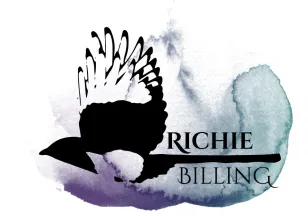
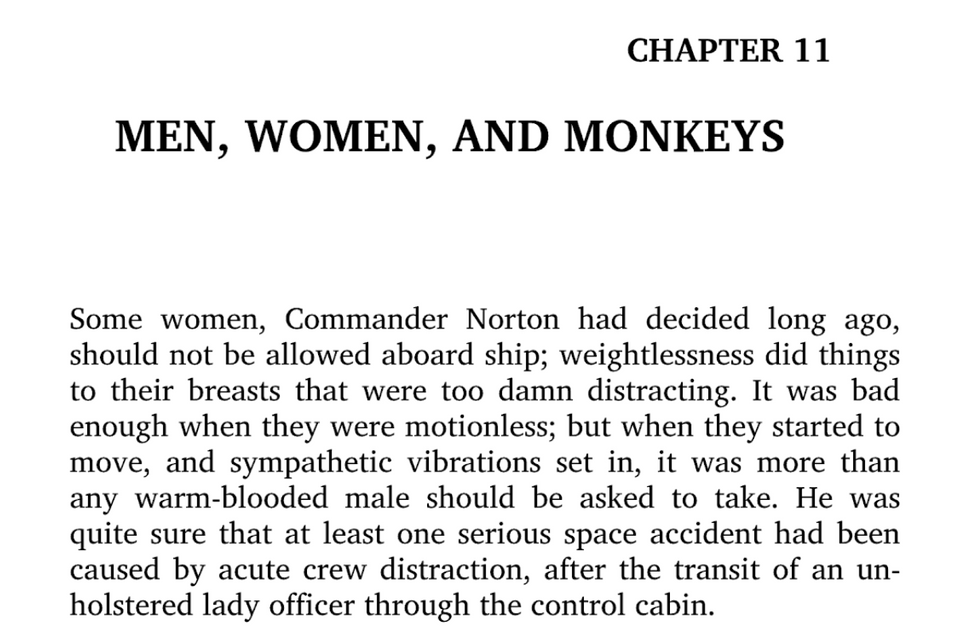
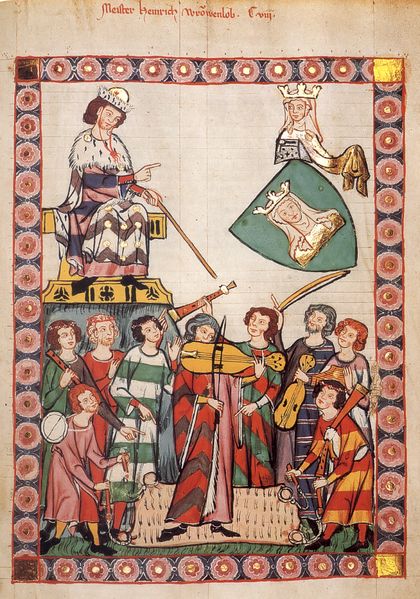
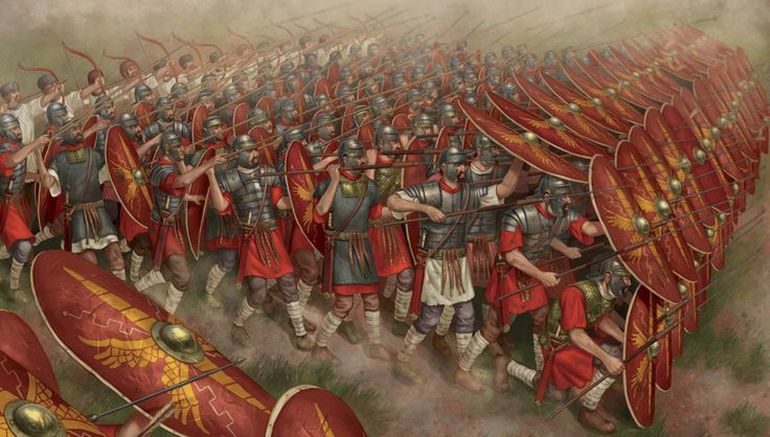
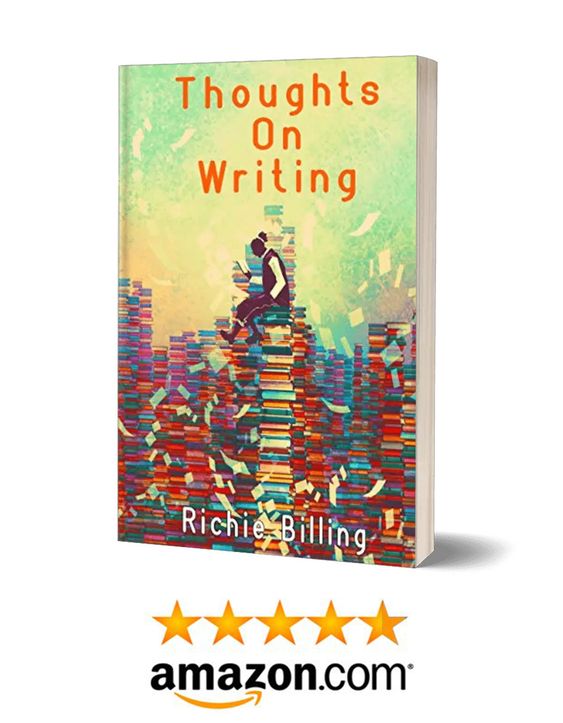
Without some of the tropes, I don’t feel fantasy would really be fantasy. I think those who love fantasy look for these tropes to make the books “feel” like they belong in this genre. The same could be said of romance, which to me overindulges in their tropes, but romance readers love it.
The good thing to do to make your book stand out a little more is to introduce new settings or characters. In “The Unborn Hero of Dragon Village” we have some of the common tropes, but the book is based on Slavic mythology, in particular Bulgarian beliefs. It keeps the warm, friendly (ha, if you can call battles friendly) feel, but also introduces readers to a new world they can explore.
I agree with you! The tropes have made fantasy what they are. I think the complaints stem from badly done things, or ‘rip offs’ of existing stories. Your approach is an excellent one! There’s a mine of inspiration out there waiting to be tapped which you prove with the Slavic mythology. That’s a new one to me and one I’d like to check out. Link me if you can!
This is the link to the particular book I was speaking about: https://books2read.com/UnbornHero-DV
Reblogged this on adaratrosclair and commented:
Thank you, Richie, for this fabulously informational post! I will use this to plan my fantasy WIP. 🙂
You’re very welcome Monique! Thank you so much for sharing it too. I hope it helps!
You’re welcome. 🙂
Insightful post. I agree that some of those tropes are overused, but you can always put a spin on them. Cheers.
Also, I stopped receiving email alerts from your blog, Rich. Not sure why—I’m still following.
Very strange! Are you on my mailing list or the Wordpress follow thing? Thanks for checking this one out anyway. Glad to hear you found it useful!
For the ‘Settings resembling Medieval Europe’, we write what we know, and perhaps our readers would be less interested in the more exotic. The more you deviate from Medieval Europe, the more you might alienate readers from the Americas and Europe.
That being said, I would LOVE to see a setting that would be place in, say, an ancient Mid-Eastern, African, or Indian setting. But who could say they are familiar enough with those ancient cultures to use them as a basis for writing? I’m not. And if I tried, it might somehow come off as culturally offensive.
That leads me to the next comment: There’s also the recent case of a fantasy writer who set her story in a world that was very Asian-like. She was attacked for stereotyping since she wasn’t Asian, and even though those who first launched the attack had only read the cover summary. The book was even pulled until it could be re-examined and edited for content and she had to make a full apology! It really puts a chill on trying to write from something other than Medieval Europe, doesn’t it?
Jason, there’s a lot of the “racist” scream sounding. It does indeed put a damper on things but I’m shocked that the book was pulled and “edited for content” as this smacks of censorship in its lowest form.
Were I to guess, which is all this is, the author is a person whose sole source of information is the WWW and their local library and educational tv. Not everyone can afford to fly to Asia and spend any length of time basking in culture and terrain. I feel sorry for the writer because she poured her heart into this story and was slammed for something she never intended. Never yet have I met a writer who didn’t love their “people” and she was hurt for her fiction as well as herself.
Recently I was tossed from a writing group because I asked the black members to tell me if they were offended by one black man calling another black man the N word. And, yes, I spelled it out. After being informed by a black woman that she was “generally uncomfortable” with a white author using iterations of the word I changed the story and apologized. Fat lot of good it did. Interestingly, the black members who responded (and few did) they used emojis and “thumbs up”. More whites were vocal about it and most of the respondents said, “Hey, it’s your story. Don’t let them tell you what to do.”
That may not, obviously from what you’ve said, be an option in these politically tender times. I’m going to ask in the future and do my research. One reason for this is I truly don’t want to hurt any feelings. Two, controversy may sell but it can also get you yanked. I’d be interested to know that name of this beleaguered author so I can buy her book.
I wrote about this on my blog site uneasywriter.blog and it all boils down to this: you’re the writer, it’s your story. Your baby.
This was a good check-in for me. I’ve been concerned that the concept I have in mind is just another trope, and was researching the idea that fantasy IS tropes when I found this timely post. Thankfully, I may have something a little fresher than these cooking! How exciting 🙂 thank you.
Sauron just wanted to rule everything, didn’t he? He was Morgoth’s second in command and when brute force didn’t work he had to resort to trickery. He played the long game and used the rings to corrupt everything. I don’t think “Killing everything” was ever the plan.
Found it. The author’s name was Amélie Wen Zhao.
Here’s a good article on her incident and commentary about it:
https://www.spectator.co.uk/2019/05/writers-blocked-even-fantasy-fiction-is-now-offensive/
Cheers and happy writing,
Jason
I remember this too. Incredible the damage a couple of reviewers can do
Pingback: Men Writing Women, Passive Voice, and Overused Clichés: A Look Back at 2019 – Richie Billing
Pingback: What Is Characterization? – Richie Billing
Pingback: How Many Fantasy Subgenres Are There? - Richie Billing
Pingback: Character Development - Writing Compelling Characters | Richie Billing
Pingback: Men Writing Women Characters - Never Make These Mistakes! | Richie Billing
Pingback: What Is Prose Writing? [With Examples] - Richie Billing